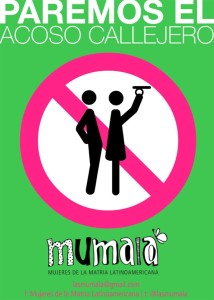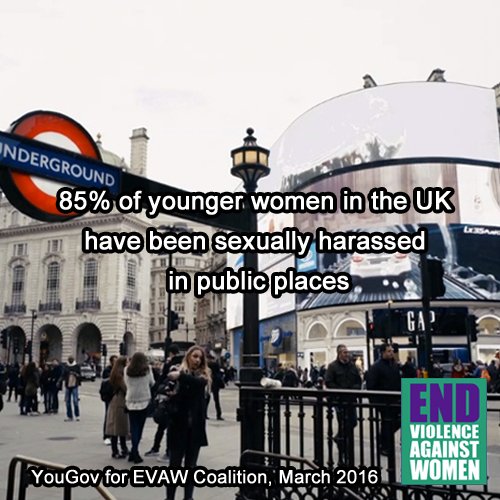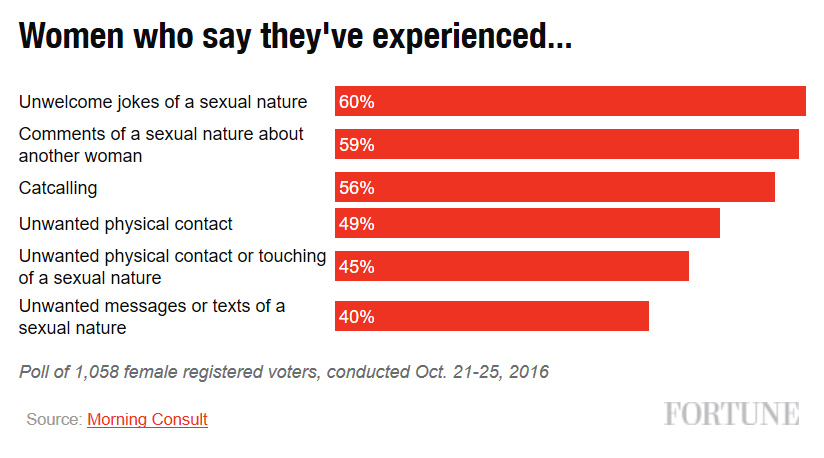A new phone poll of more than 1,000 randomly selected registered female voters in the USA finds that sexual abuse is common. Among the findings, 56% had experienced “catcalling” and 45% had experienced unwanted sexual touching.
100% of Women in Buenos Aires have Experienced Street Harassment
 International Anti-Street Harassment Week officially kicks off tomorrow, but the global activism is already starting…!!
International Anti-Street Harassment Week officially kicks off tomorrow, but the global activism is already starting…!!
Last year, there was legislation passed in Argentina to designate an annual day against street harassment, to coincide around the time of International Anti-Street Harassment Week.
The day was yesterday and The Movement of Women of the Motherland of Latin American released a new study showing 100% of women in the City of Buenos Aires have experienced street harassment. The full survey results are available in Spanish. They include the following:
“Half the participants reported being subjected to sexually explicit comments, 59 percent reported obscene gestures, 47 percent had been followed by a man and 37 percent reported having a man’s genitalia exposed to them unasked…
87 percent reported avoiding dark or deserted streets, 63 percent won’t walk in certain areas unaccompanied and 51 percent dress in a manner that ‘doesn’t attract attention.'”

The survey is part of larger campaign launched by MuMaLá called #ParemosElAcosoCallejero (#StopStreetHarassment).
The campaigners have an up-hill battle as the country’s President once said, “All women like to be told compliments, even if if it’s something something rude like, ‘What a cute ass you have’… it’s all good,” but documenting the problem and showing the negative affects it can have is an important way to start changing public opinion.
New Studies in the Philippines and Israel
The UK was not the only country to have a new study about street harassment released for International Women’s Day, statistics were released in the Philippines and Israel, too.
Philippines:
In February 2016, SWS surveyed people in barangays Payatas and Bagong Silangan in Quezon City regarding sexual harassment in public spaces.
Prevalence:
88% of women ages 18 to 24 experienced sexual harassment at least once.
1 in 7 of the surveyed women experienced sexual harassment at least once every week in the past year.
Types:
Across all ages, 12 to 55 and above, wolf whistling and catcalling were the most common forms. However, 34% of women experienced the “worst forms” of sexual harassment: flashing, public masturbation, and groping.
Perpetrators:
Seventy percent of women said they were harassed by a “complete stranger,” while others said it was by “someone they see around the neighborhood,” acquaintances, and “someone they are close to.”
3 out of 5 men surveyed confessed to committing a form of sexual harassment at least once in their lifetime, while 1 in 7 admitted to doing it at least daily over the past year.
When:
The majority of the incidents happen in broad daylight. Seventy percent of cases happen during the day, between 6 am and 6 pm, and only 4% of cases were reported occurring at night.
You can read more survey results and learn about the UN Women campaign underway in the city via this Rappler article.
Israel:
The organization NA’AMAT release a survey about youth and sexual harassment, the following is pulled from a Jerusalem Post article about it.
Prevalence:
68% of girls responded that they were harassed by a man they didn’t know on the street at least once, while 45% said this happened more than once.
Perpetrators:
47% of boys admitted that they had shouted out to a woman or girl that they didn’t know on the street and around 34% said they had done this more than once.
Attitudes:
“A little over a third of youth – both boys and girls – said that if a woman acts or dresses provocatively then she shares in the blame of sexual assault. Only 53% of youth felt that only the attacker was to blame in the case of sexual assault.”
The UK’s First National Street Harassment Study
 End Violence Against Women Coalition, our allies in the UK, commissioned YouGov to conduct the first national poll on street harassment. The results were released today, for International Women’s Day.
End Violence Against Women Coalition, our allies in the UK, commissioned YouGov to conduct the first national poll on street harassment. The results were released today, for International Women’s Day.
Prevalence:
64% of women of all ages have experienced unwanted sexual harassment in public places. (This is almost the same as the USA, our 2014 study found that 65% of women had been harassed.) Additionally, 35% of women had experienced unwanted sexual touching.
Age:
When they looked at just young women ages 18-24, however, the percentages increased significantly: 85% had faced sexual harassment in public spaces and 45% had experienced unwanted sexual touching.
Related, across all ages of women, most said it began at a young age. More than 1 in 4 said it happened before age 16, and more than 3 in 4 said it happened by age 21.
Bystanders/Upstanders:
Sadly, only 11% of women said anyone had intervened when they were harassed though 81% said they wished someone had.
Changing Their Life:
When it comes to feeling safe, 63% of women (versus 45% of men) said they generally feel unsafe in public spaces and almost half do conscious “safety planning” when they go out in the evenings.
What Can We Do:
When asked what should be done, many said “they supported more police (53%), better street lighting (38%), more transport staff (38%) and public awareness campaigns encouraging others to intervene (35%). No women we asked believed this problem should be ignored and no measures taken.”
Racialized Sexual Harassment:
Because women of color may also face racialized sexual harassment, EVAW partnered with Imkaan to produce a five minute film featuring young women of color talking about their experiences.
In discussing what it feels like to experience racist sexual harassment one woman in the film says:
“My experiences are different as a Black woman than they are for my white friends. I should be ‘up for it’ or I am ‘fair game’, or I shouldn’t care if my body is touched in a specific way.
And another woman says:
“After me ignoring them, that’s when it turns racial, so that’s when it might be ‘you black this’ or ‘you black that…how dare you ignore me’.”
In a press release for the film and survey, Lia Latchford, Policy and Campaigns Coordinator at Imkaan said:
“Our film tells a powerful story of young black women’s everyday experience of racialised sexual harassment. For us, we cannot ‘leave race out of it’ because the way we are treated is based on how our whole identities are perceived as black women. This harassment and abuse often uses racist stereotypes and insults as an attempt to put black women in our place. Everyone, adults and young people alike, need to talk about it and it needs to stop.”
Sarah Green, Acting Director at the End Violence Against Women Coalition said:
“Sexual harassment is an everyday experience which women and girls learn to deal with, but it’s time to hold a mirror up to it and challenge it. We did this survey to find out about the scale of sexual harassment and the impact it has on the way women live. If women are planning their lives around not being harassed or assaulted, they are not free. Women should be free to live their lives without the threat of harassment and violence, not having to plan and limit their choices to make sure they’re safe.”
Second Street Harassment Study in Chile
Posted with the permission of Observatorio Contra el Acoso Callejero Chile
* New study shows that serious street harassment practices such as touching, exhibitionism and masturbation affect two in every five people on average.
* High percentage of citizens agree that sexual harassment in streets should be punished.
SANTIAGO, 19 March.- This week (March, 16th), at the former Congress, the Observatorio Cotra el Acoso Callejero – OCAC Chile (Observatory Against Street Harassment) presented the results of its second study, “Is Chile willing to punish street harassment? Study of characterization and opinion about street harassment and possible sanctions.”
Among the findings of the study, notes that three out of four people have suffered street harassment in Chile in the last 12 months, which means 75% of the population. In the case of women, the percentage reaches 85% and of men 55%.
The study also revealed that cases of street harassment are common: two in five people have suffered rubbing, touching or groping in public spaces, and 23% of women have experienced some form of serious harassment (persecution, exhibitionism, public masturbation).
Regarding the perception of the public on this issue, the results show that 84% of people totally disapprove any practice of harassment, whether “compliments”, groping or exhibitionism.
Another surprising fact was the boldness of the result of the question “Are you willing to punish street harassment?”. The answer was a resounding yes: over 90% of people said they would sanction any for of street harassment. What, in the Observatory’s opinion, demonstrates the need to legislate.
“This study reinforces our policy action: analyze a type of violence that has been naturalized and do not accept to have 12 years old girls who need to be “used to street harassment. The results of our second study demonstrate that we are facing a significant social change, Chileans think street harassment is harmful and should be punished”, said María José Guerrero, sociologist and parti of the OCAC Chile’s Studies team.
To conduct this study, OCAC Chile was sponsored by UN Women and European Union.
Press contacts
Observatorio contra el Acoso Callejero (OCAC)
Javiera Contreras
comunicaciones@ocacchile.org
+569 8136 7869
Programa de Fortalecimiento de Organizaciones de la Sociedad Civil que Promueven la Igualdad de Género ONU Mujeres – Unión European
Mónica Maureira M.
maureira.monica@gmail.com
+569 9959 4156

